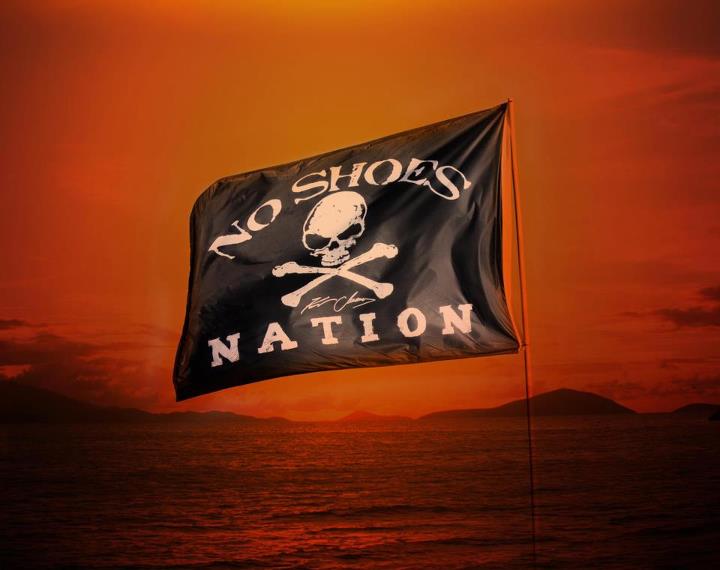Welcome to the 301st legal ethics quiz!
What? You thought I’d stop at 300? No way! You don’t reach milestones by stopping. The journey continues!
With Memorial Day weekend upon us, I officially transitioned to summer yesterday. For me, that means moving into No Shoes Nation mode. Yes, I like Kenny Chesney’s music. But, for me, NSN is more about the vibe: calm, relaxed, easy-going.
Which is exactly how summer should be.
So, last night, I fired up the grill, broke out my pirate flag, and listened to tunes on the deck.
As I did, a few lines struck me. They’re from Save It For A Rainy Day. While sung to an ex, the song is as easily directed to whatever it is that you refuse to let get you down today. Indeed, I know what I sing ‘em too, and it ain’t a person.
“Cuz the sun’s too bright
the sky’s too blue,
beer’s too cold to be thinking ‘bout you.
Gonna take this heart break
and tuck it away,
save it for a rainy day.“
Here’s my wish for you.
The forecast looks fantastic! Who knows? It might be the best weekend of the summer.
So, over the next three days, if something is weighing you down, may you tuck it away, save it for a rainy day, and enjoy the long weekend.
Onto the quiz!
Rules
- None. Open book, open search engine, text-a-friend.
- Exception: Question 5. We try to play that one honestly.
- Unless stated otherwise, the Vermont Rules of Professional Conduct apply.
- Please do not post answers as a “comment” to this post.
- E-mail answers to michael.kennedy@vtcourts.gov
- Team entries welcome, creative team names even more welcome.
- I’ll post the answers & Honor Roll on Monday,
- Please consider sharing the quiz with friends & colleagues.
- Share on social media. Hashtag it – #fiveforfriday.
Question 1
The 7 Cs of Legal Ethics include “Candor.” One of the rules that deals with candor reads as follows:
“In the course of representing a client a lawyer shall not knowingly make a false statement of ________ fact or law to a third person.” What word correctly fills in the blank?
- A. Relevant.
- B. Material.
- C. Admissible.
- C. Trick question Mike! You added the blank! The rule does not modify “fact or law.”
Questions 2
There’s a rule that, according to its title, imposes “special responsibilities.” The rule applies to any lawyer who serves as ________________:
- A. an escrow agent.
- B. a mediator.
- C. a prosecutor in a criminal case.
- D. counsel assigned to represent a person who is the subject of an involuntary guardianship petition.
Question 3
In private practice, once a representation ends, it’s not uncommon for a very small amount of an unearned retainer to remain in a lawyer’s trust account. Which is most accurate?
- A. No matter how small the amount, Lawyer must return the unearned portion of the retainer to the client.
- B. If the amount is so small that the time and expense – whether to lawyer or client – incurred by returning the money will exceed the amount itself, a lawyer may direct the lawyer’s bank to forward the funds to the Vermont Bar Foundation. By rule, this typically applies to amounts less than $25.
Question 4
Fill in the blank. The correct answer is one word.
Addressing a lawyer’s duties when using Generative AI, the Florida Bar recently issued an advisory opinion in which it suggested that before using a GAI product, a lawyer should look into whether the product provider has an enforceable obligation to maintain the ___________ of whatever information the lawyer inputs.
Question 5
A very rare “fill-in-the-blank” for Question 5. The SAME word fills each blank.
Last week, a decision from an Indiana court made national news. The story was covered by a wide range of outlets, including The ABA Journal, the New York Times, and Food & Wine. The court ruled that a taco is a ______________.
While this doesn’t exactly count as a split in the circuits, the Indiana court reached the opposite conclusion as was reached in a 2006 case in which a Massachusetts judge concluded that a taco was not a _______________.
Oh, and during a 2018 appearance on The Late Show With Stephen Colbert, Justice Ruth Bader Ginsburg ruled that, according to Colbert’s definition of a __________, a hot dog is a ___________.
I beg to differ.
In any event, the same word correctly fills in each of the 4 blanks. What word?



